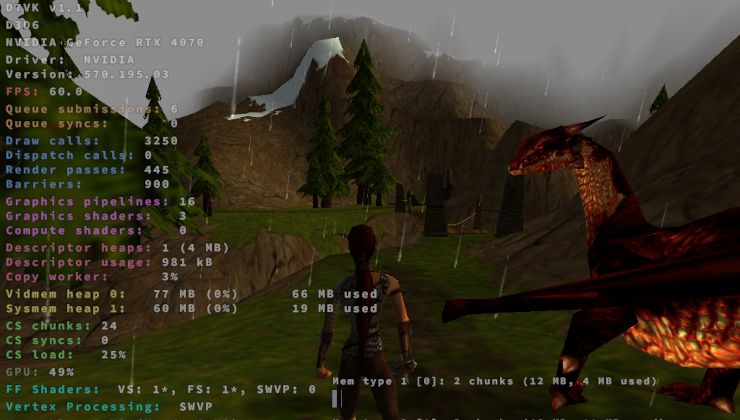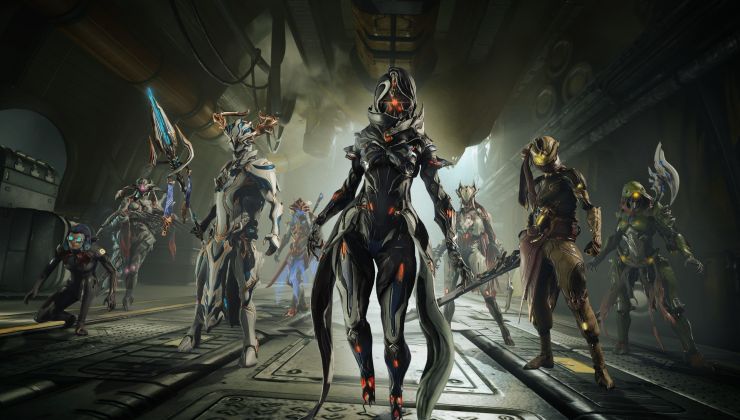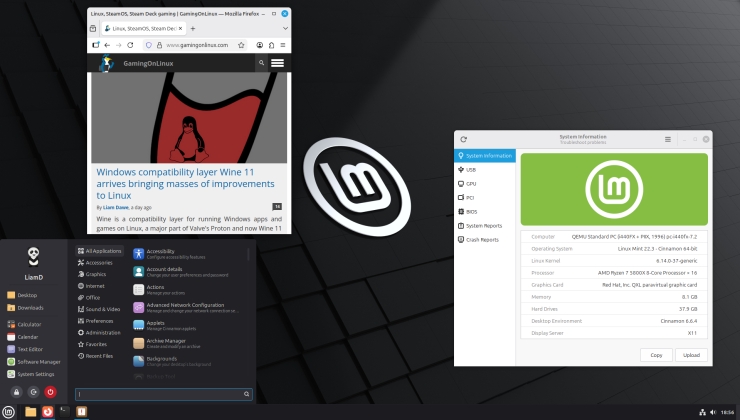Valve's rating system for Steam Deck and SteamOS seems to have sped up recently, with 20,000 games now rated at least playable. Previously they hit 19,000 in May, 18,000 in March and 17,000 in November 2024.
If a game is at least Playable on Steam Deck, it will also be compatible with SteamOS. The ratings for SteamOS are a bit different to how it's done on Steam Deck with less being checked. The main point for the SteamOS rating is that the game will actually load up and be playable, but performance and features will depend on the specific device you have SteamOS on. Compared with Steam Deck where performance is supposed to be checked along with full controller support, resolution and more.
Games that were recently rated  Verified include:
Verified include:
FBC: Firebreak
The rating is not actually live on the store yet at time of writing but it will be soon
FANTASY LIFE i: The Girl Who Steals Time
Rune Factory: Guardians of Azuma
And some that recently hit  Playable:
Playable:
The Alters
Small text on Steam Deck
Dune: Awakening
Small text on Steam Deck
Check out my previous initial review
After Inc: Revival
Small text on Steam Deck and it may show the wrong controller icons.
Slayaway Camp
May show the wrong controller icons and manual on-screen keyboard.
Nubby's Number Factory
Small text on Steam Deck, manual on-screen keyboard and it may show the wrong controller icons.
I really do love this one
There have been issues with the ratings in the past. Overall though, the rating is just to show you what should be playable. People have pretty wildly different feelings on what is "playable" though. It's not a perfect system but even on traditional consoles games slip through that don't work well. Hopefully Valve will continue tweaking their tests over time to make them as accurate as possible.
Given the unique nature of Steam for Linux systems like Steam Deck / SteamOS, this is only counting games that have actually been tested. Many more will be playable.
Last edited by ElectricPrism on 13 Jun 2025 at 5:45 pm UTC
I feel like some of us should bake a celebratory cake and tag @Steam and @ValveSoftware in a picture of itBut THE CAKE IS A LIE :wub:
In all seriousness though, 20K games is extremely impressive :grin: Remember that PS4 only had 3,500 games, and Nintendo Switch only has 6000 titles. Both consoles have existed far longer than the Steam Deck though
Meanwhile, if you install Windows™, there will be 100% of the PC games available.
And no, Windows actually cannot run them all, Windows does have its own compatibility problems too. Far less, but issues do still exist. Not sure why you're pointing it out though, we all know the hill Linux gaming has to climb here.
Last edited by Liam Dawe on 14 Jun 2025 at 8:18 am UTC
The gap is not that big. The important issue at this point is not so much actual incompatibility, it's more the anti-cheat situation.
Last edited by Purple Library Guy on 15 Jun 2025 at 5:47 pm UTC
A portion of DLsite's games are unplayable on Linux if they use DRM other than PlayDRM. And physical editions of visual novels, if they are encumbered by DRM, usually don't work either.
I haven't tested them, but I would be very surprised if Johren's visual novels worked either.
Still, that leaves you with a lot of visual novels from DLsite and Steam to play.
And certainly, there is a lot of DRM in games on Steam that works in Proton, I've heard.
I looked up the WineHQ bug for Soft-Denchi specifically years ago, and the problem is the DRM tries to call some sort of string encryption function in the Windows API that is only partially implemented in Wine, so it fails. Somebody submitted for a patch for it years ago - I forget if it was merged or not.
Edit: Here's the link: https://bugs.winehq.org/show_bug.cgi?id=52441 - Looks like somebody submitted an anonymous patch (????) and took off. Never got merged...
So, if they focused on it, I'm sure they could get it to work. But it seems pretty low priority as Japanese language visual novels are a niche among niches. And according to WineHQ, it's no fun trying to get copy protection to work in Wine: https://gitlab.winehq.org/wine/wine/-/wikis/Copy-Protection
Fortunately, I'd say over 90% of visual novels work just fine in a Windows VM that you can run inside of Linux. They're very undemanding games. Hell, you could probably run most of them on a Windows XP VM.
Last edited by pleasereadthemanual on 17 Jun 2025 at 4:20 am UTC
What I am trying to say is there is no point celebrating a victory in battle if we are losing the war. And what I want to know is… How are we faring in this "war"? Does Linux share grow or does it shrink?
P.S. I am firmly in the NTNB camp.
Linux user share is the war. Linux native game share is a battle, which will ultimately be won automatically if the wider war is won. And lost automatically if the wider war is lost.
The Linux user share war is won by people switching to Linux and buying devices, say to play games on, which happen to have Linux on them. And one big question people will ask when considering whether to switch, or to buy such a device, is "Can I play my games?"
If the answer is entirely or mostly "No", they will not switch or buy. We saw this with the Steam Machine, which admittedly had other problems, but that was key among them. Even "sorta half and half" is not good enough.
If the answer is entirely or mostly "Yes", they may switch or buy. We see this now with the Steam Deck, which is selling very well. Since the introduction of the Steam Deck, the Linux share on Steam has gone from less than 1% to approaching 2.5%. Some of that is from the Deck itself, some is from increases in desktop Linux. Both of these increases are certainly dependent on the effectiveness of Proton.
If this increase continues for a few more years, Linux will be hitting numbers that make it worth money to pay attention to. Then native Linux games will certainly increase. I think that since Proton became a big thing, native Linux titles have decreased some, but it hasn't been nearly as much as I was expecting. The ease of using Proton seems to have been offset somewhat by increased buzz around the Steam Deck and SteamOS. But, if Linux user share had kept stagnating, native Linux game share would also, and probably in fact have continued to decline.
So, if someone wanting native Linux games were given a magic wand, which they could wave to kill Proton so developers wanting to target Linux would have to go native, this would be tactically a bare win in the very short term, but strategically disastrous. They would be fools to wave that wand.
Valve made it abundantly clear that it does not support Linux, it propagates "SteamPlay". Nowhere on their site you can find a Linux logo (sans "hwsurvey" page). And Proton™ while being in fact just a re-branded WINE for uneducated "new" user looks like a Valve's technology not associated with Linux. And you are right, a lot of (around 17.59% or so if we look up the GPU section for "AMD Custom GPU 0405") so called "Linux users" are in fact "Steam Deck" users and something tells me most of them do not know what Linux is besides the fact that it is the same thing that is on their Android™ smartphone. For all intents and purposes these "new" Linux users are just Windows users who just happen to have additional device for in-travel entertainment. Well, that or we are counting all Android™ smartphone owners as Linux users :)
Meanwhile, the number of Linux game releases has declined. Maybe not as much as some anticipated, but still it is a net loss. Now we have "Just Use Proton" and "It Works Fine With Proton" as two additional catch-phrases developers use to justify their rejection of Linux (in addition to "Linux Is Too Niche").
And all your "for all intents and purposes" and what Valve "intends" and talk of Android seem to almost intentionally miss the point. SteamOS is Linux--there's no discussion about this, there's no "well in this way it is and in this way it isn't"--SteamOS is Gnu/Linux, software that runs on SteamOS runs on Linux (which is not true of Android). What's running on the metal is Linux. And at the rate things are going, Linux will not be too niche. When Linux is no longer too niche, native Linux titles will increase--I've never seen a credible counterargument. And this is happening because Proton dropped the barriers to adoption. That's just the way it is.








 How to setup OpenMW for modern Morrowind on Linux / SteamOS and Steam Deck
How to setup OpenMW for modern Morrowind on Linux / SteamOS and Steam Deck How to install Hollow Knight: Silksong mods on Linux, SteamOS and Steam Deck
How to install Hollow Knight: Silksong mods on Linux, SteamOS and Steam Deck